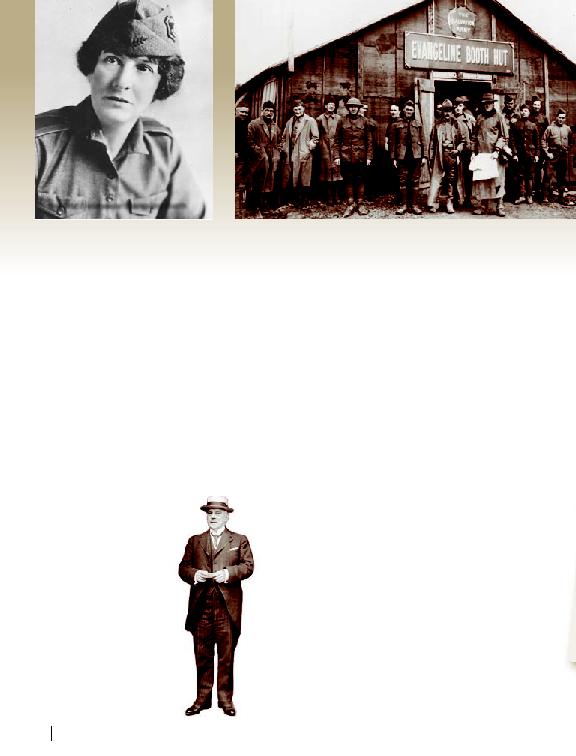
our wartime overseas service began to
swing open. But the hinge was the testi-
mony, in that crucial moment, of a law-
yer who had found the Lord through
the Army's work with alcoholics!
Salvation Army's work with American
doughboys overseas during World War
I, and the profound effect this had on
the public's perception of us. If so you
are likely to say, "That was a long, long
time ago. Why tell it again now?"
work, while carrying out his "normal"
ministry, was used by the Lord to do
something with unexpectedly far-reach-
ing results. The testimony of the lawyer
whose life was changed resulted in that
letter from the president's secretary.
It did not grant The Salvation Army
authority to put any specific plan into
motion, only the right to carry to U.S.
military leaders the offer to place
Salvationists at their disposal.
Armed with that letter and
sent to France, Colonel Barker
was able to deal directly with
American military officers. Some
of those brushed off the idea as ill-
advised, and had brushed him off
as well. But he pressed on until he
faced General John J. Pershing, a
man described by one historian as
"cold-eyed" and "granite-faced," a
consequence of the tragedy he had
and its aftermath now becomes a vital
part of our story.
REMEMBERS
completing a second tour of duty in the
Philippines, was living in San Francisco
with his wife and four children when
he was hurriedly called by President
Woodrow Wilson to halt the depreda-
tions of the elusive Mexican bandit,
Pancho Villa, who had the audacity to
make a surprise raid on a U.S. Army
cavalry garrison at Columbus, New
Mexico. Hardly had Pershing arrived in
El Paso, Texas, where his troops were
assembling, when he received tragic
news. His wife and three daughters
were burned to death in a fire in their
The Salvation Army's provincial
sympathy, as did other
titude was in sharp contrast
to that of the respectable
outsider. Often in those days,
brats" were not highly thought of in the
settled communities where they tem-
porarily resided. They would move in,
stay for a time, then suddenly move out
again at the behest of military leader-
ship. Pershing never forgot the Army's
kindness, which touched him deeply.
The renegade had not been caught,
although his bandits had ceased their
depredations. However, a more serious
problem had arisen; the government
of Mexico did not take kindly to having
American troops trespassing in their
country, even commandeering a loco-
motive for the pursuit of the bandit.
In fact, Mexico considered America's
intrusion to be an act of war. Finally,
President Woodrow Wilson decided
there were matters weightier than risk-
ing a full-blown war with our neighbor
to the south, so early in February 1917
Pershing, by then a major-general, and
his troops, were recalled.
picked by him, commanding an as�yet
non�existent expeditionary force. The
presidential directive was very specific,
stipulating that "the forces of the United
States are to be a separate and distinct
component of the combined forces, the
identity of which must be preserved...
you will exercise full discretion in de-
termining the manner of cooperation."
early stages. The French, British
The S
tit
to